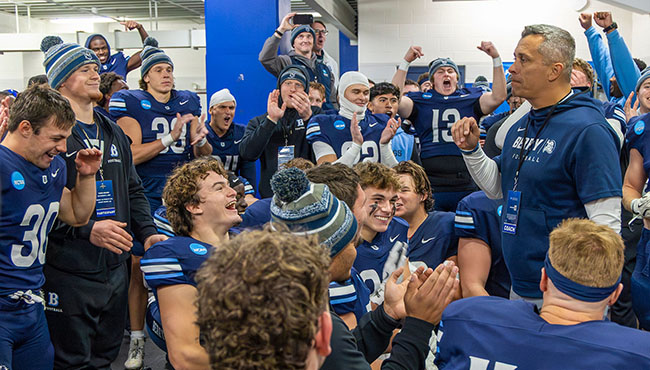Not every full-time college student views education as their sole job. Recent data from the National Center for Education Statistics (NCES) actually shows that 43 percent of full-time college students are at least partially employed.
Berry College recognizes there’s actually a lot of value in balancing employment and education. In fact, there are a number of benefits you could enjoy by working in college.
6 Benefits students can gain by working in college
“Work is at the very heart of Berry College, because our commitment is to prepare the whole student for all of life,” says Marc Hunsaker, dean of personal and professional development at Berry College. Take a look at some of the ways working in college can prepare students for success in school and beyond.
1. You can offset some of your college costs
Over time, even modest paychecks can really add up. “Working during college can help students develop greater financial literacy as they learn how to create a budget and how to manage their money,” Hunsaker says. “And paying what you can afford as you go can definitely make a dent in the cost of college.”
It’s also worth noting that Berry students (who work part-time) earn an average of $9,000 by the time they graduate. That can be put toward paying for tuition. Also consider that there are grants and scholarships available. Berry actually awards a very generous scholarship to a select number of students each year that provides them the opportunity to leave school debt-free by participating in the student work program.
2. You can make yourself more attractive to future employers
Students are often hungry to secure internships related to their future career. There’s certainly evidence to suggest that employers notice those experiences. One study reports graduates who completed an internship are 14 percent more likely to be invited for an interview.
But you can benefit even from seemingly unrelated work experiences. A report that focused on working students explains that early employment helps students develop important workplace competencies like the ability to think critically and communicate effectively.
“More and more, employers are looking for candidates who have a set of skills that transcend any particular career or professional field,” Dr. Hunsaker explains. “Some people call them ‘soft skills’ or ‘power skills,’ but because they are desired by and applicable to so many different careers, I prefer the term ‘boundary spanning skills.’”
3. You may achieve greater academic success
Not everyone feels positively about the idea of students balancing work and school. Some worry it could lead to academic struggles, yet students often see positive results by working part-time. Research has actually shown that students who work between 10 and 20 hours per week have a higher GPA than those who forgo employment. That said, achieving the right balance is key.
“The research is clear that working more than 20 hours per week is often detrimental to students’ academic engagement in college,” Hunsaker notes. “Students often report that this level of work makes it very difficult to manage their course load and job responsibilities. This is part of why we limit the number of hours a student can work on campus in a given term.”
4. You could earn a higher salary after graduating
Regardless of the mechanisms at play, it’s clear that work experience during college is positively associated with greater earnings after graduating. Research has found that students who were employed during school enjoy a higher salary than their peers. Hunsaker says that boost in net earnings can stick with graduates throughout their entire lives as well.
5. You can learn about yourself and potentially find your purpose
Hunsaker is a firm believer that work experiences during college can help students learn a great deal about themselves, including their skills, values, passions and purpose. His own research focuses on how developing a sense of purpose enhances young adults’ experiences of meaningful work and promotes long-term engagement and satisfaction in work.
“I really do believe that all on-campus jobs provide students with incredible opportunities to learn how to engage in meaningful work,” Hunsaker emphasizes. “And I think that developing a sense of purpose is an invaluable skill that more colleges should help young adults to explore, articulate and pursue.”
6. You can expand your professional network
Lastly, working during school can help you make numerous professional connections. Much of that stems from the built-in mentorship that work environments provide. Students who are just starting out form connections with supervisors, Dr. Hunsaker notes, which can help them learn how to value advice from more experienced colleagues and how to ask smart questions.
“I think mentorship is incredibly important for student success in and beyond college,” Hunsaker emphasizes. Keep in mind that people remember hardworking co-workers and employees, which can lead to professional opportunities down the road.
Reap the rewards of working in college
Working in college can provide you with more than just a source of income. It can also encourage strong academic performance and help you develop key skills, provided you strike the right balance.
“Having a good relationship with your work supervisor is critical,” Dr. Hunsaker says. That way you can work together to make adjustments if looming exams or projects start to present problems.
If you can see yourself at a school dedicated to your professional development, you might want to explore some of the degree options at Berry College. Learn more about how you could set yourself up for lifelong career success by visiting our Academic Programs page.



